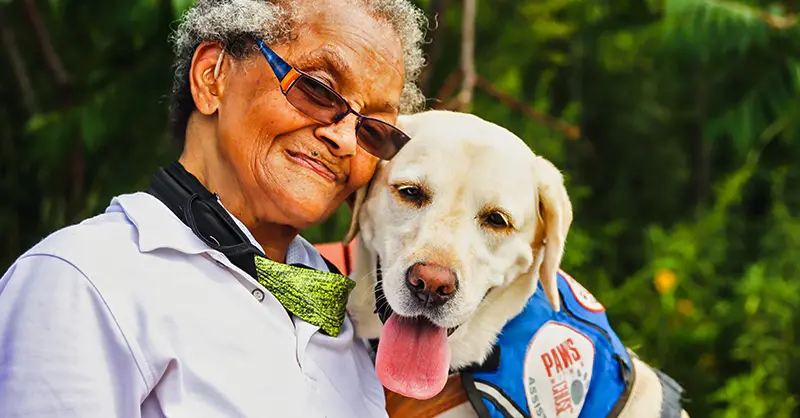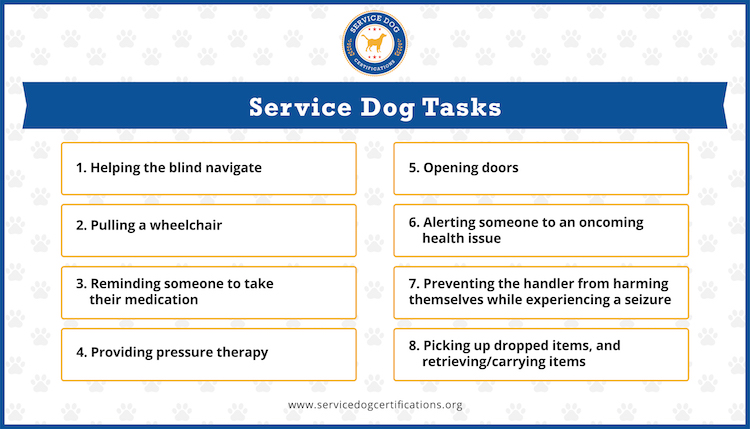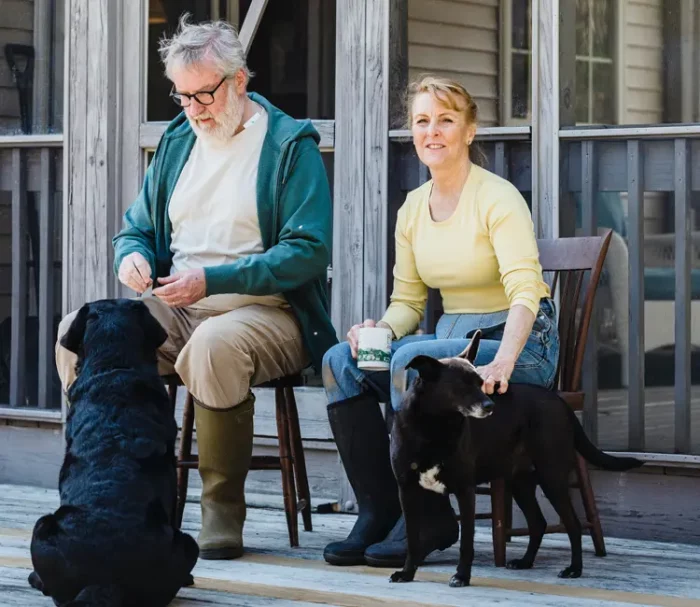Service Dogs for Seniors

According to the most recent U.S. Census Bureau Data (2010), about 40.3 million people aged 65 and older live in the U.S, and the numbers keep growing. The U.S. Census Bureau estimates that the senior population may exceed 70 million by 2030. And with this rapid growth in the number of seniors comes the need for daily care. One excellent source for daily senior assistance is a service dog.
Aging in Place
The last two decades saw significant population increases in the 65+ age group. And approximately 87 percent of seniors want to “age in place,” which means that their first preference is to remain in their home and community as they grow older. Despite this desire to stay in familiar surroundings, seniors often live alone.
Pew Research data shows that about half of seniors in the U.S. share a home alone with a spouse or partner. And approximately 27 percent of seniors live by themselves. Older women are more likely to live alone, and — as children grow up and move out — seniors are more likely to live in small households. Rather than moving to a retirement community or moving away, many seniors opt to stay somewhere familiar when they need it most.
How a Service Dog Can Help Senior Citizens
As all people age, however, health begins to decline. Physical challenges — like reduced mobility and vision — and medical issues can pose risks for seniors living alone. A service dog can help address many of these issues, allowing disabled seniors to live their golden years in a safer environment.
What is a Service Dog?
A service dog is not a pet, nor is it a therapy dog or emotional support animal. Service dogs help people who have a physical or mental health disability. A service dog is a dog that has received individualized training to accomplish tasks for people with disabilities.
Federal laws protect service dogs. The Americans with Disabilities Act (ADA), for example, enables service dogs to accompany their owners into areas where animals are not typically allowed. A service dog may follow their handler anywhere accessible to the general public. These areas include restaurants, parks, theaters, stores, to name a few. Service dogs are provided such comprehensive access because service dogs are not pets — they are critical to the health and well-being of their handler.
Other federal laws protecting service dogs are the Housing and Urban Development’s Fair Housing Act and the Transportation Department’s Air Carrier Access Act. Under the FHA, service animals may live with their handlers in “no pets allowed” housing. For example, a senior living in a “no pets” rental may live with a service dog free from fees and discrimination because the FHA protects their ability to live with their service dog.
When it comes to travel, the ACAA allows service dogs to fly in an airplane’s cabin with their handler without fees. Along with these federal laws, some states also have laws that pertain to service dogs.
What a Service Dog Can Do
Laws exist to protect the presence of service dogs because they’re a vital part of a person’s safety and health. As many seniors live alone, service dogs can offer an extra layer of security and peace of mind. Some of the tasks service dogs can perform for their handlers include:
- Alerting and safeguarding a person prone to seizures.
- Obtaining and reminding a person of their medication.
- Opening cabinets and doors for a person.
- Serving as a physical brace for someone with mobility problems.
- Alerting a deaf or hard of hearing person of alarms, bells, or knocks on the door.
- Contacting emergency services through a pre-arranged method.
- Assisting a person off the floor if they fall.
- Alerting a diabetic person to significant blood sugar changes.
- Monitoring for the presence of allergens such as peanuts.

How Can a Senior Qualify for a Service Dog?
First and foremost, to qualify for a service dog, a senior must have a mental or physical disability that impacts their daily life. Service dog candidates must show that there is a task they need to be done by the dog and that the task relates specifically to their disability. For example, a senior with a hearing impairment may show that a service dog can notify them of the doorbell, phone calls, and other auditory alerts. In addition, the senior must have the capacity to independently care for the dog — both financially and with daily care —, and must have a way to give commands and maintain control of the dog. Lastly, the senior’s home must be a safe environment for the dog.
It’s critical to note that you do not need any type of documentation to prove that you have a service dog. You may have seen service dog owners with ID cards, certificates, special vests and harnesses or registration badges. These accessories are used only to help signal to the public that you have a working service dog, but they are not required. They also do not qualify anyone for a service dog or function in lieu of proper service dog verification.
Third parties are allowed to verify service dogs by asking two questions: 1. Is the dog required because of a disability and 2. What work or task has the dog been trained to perform? If you are flying with a service dog, you will be required to complete the DOT’s Service Animal Air Transportation Form prior to boarding your flight.
Service Dogs Can Assist and Comfort Seniors
Service dogs are an excellent option for seniors who have a disability. Not only do they perform tasks that can make a senior’s life safer and more manageable, but they also offer companionship and comfort.
Let everyone know your service dog is an indispensable part of your life with your Service Dog ID. Get your service dog registered here.
About the Author: The writing team at Service Dog Certifications is made up of folks who really know their stuff when it comes to disability laws and assistance animals. Many of our writers and editors have service dogs themselves and share insights from their own experiences. All of us have a passion for disability rights and animals.
4 comments
Leave a Reply Cancel reply
Latest Posts

Can you bring a service dog to a museum?
Yes, you can bring your service dog to the museum! All the major U.S. museums welcome guests with service animals in accordance with the Americans with Disabilities Act (ADA). There are some areas, however, that might be off-limits. Here’s what you should know if you plan to spend a day at the museum with your […]

Read More

How to Bring a Service Dog to Six Flags Magic Mountain
Service dogs are welcome at Six Flags Magic Mountain so long as they are, according to Six Flags, “trained to do work or perform tasks for people with disabilities.” Of course, your dog must be housebroken and remain on a leash or harness and under your control while at the park — and the park […]

Read More

When Stores Can Refuse Your Service Dog
According to the Americans with Disabilities Act (ADA), service dogs should be allowed into any store most of the time. A store owner can legally exclude a service dog if they are actively growling, snapping at, or frightening customers, or if the dog is obviously out of the control of its owner. Ordinary behaviors — […]

Read More





Hello, I’m a disabled, low income, 63 yo male. I live in Modesto, California. I am alone and fall quite often. I have a muscular disease. I need a service dog. Any suggestions? Thank you, Geno
Unfortunately we do not provide service dog adoption referrals. We wish you the best of luck in your search however.
Does the service dog need to be the only dog in the home?
Service dog owners can have other dogs in their home, whether they are another service dog or normal dog (assuming the building allows for non-service dogs).